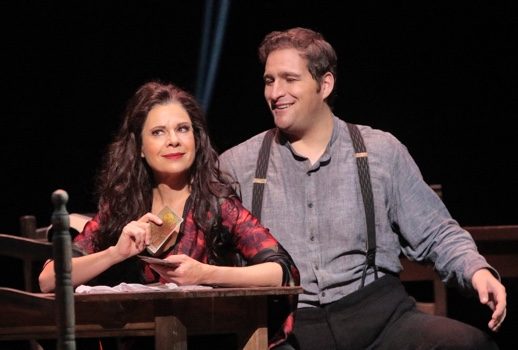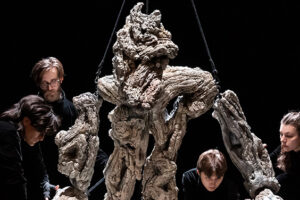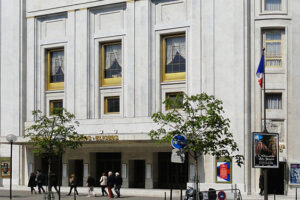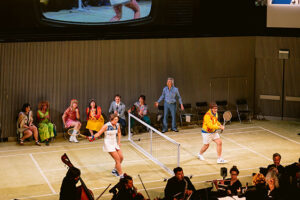

Ana María Martínez gets lost in the shuffle.
When you attend a performance of Georges Bizet’s Carmen you can never be quite certain which one you’re in for.
There can be enormous differences in staging styles having to do with mood and atmosphere and the era the director decides to land the action in. The singing actors themselves influence the audience’s experience based on how detailed, or not, they paint their characterizations. Hopefully a well-informed designer can be found lurking about somewhere as well.
Then there’s the musical aspect with the abundance of choices in editions including whether or not you use the original opéra-comique text with dialogue between the musical numbers or the recitatives written after the composer’s death, by his colleague and friend Ernest Guiraud, for the Vienna premiere.
Last night;s opening of the LA Opera season saw le tout Los Angeles out, polished up, and ready to have themselves a time with Bizet’s perennial fan snapper. Local favorite Ana Maria Martinez was presenting her gypsy vixen for the first time here after outings with Houston Grand Opera and Santa Fe.
The production originally directed by Emilio Saggi and presented here in 2004 originated from Madrid’s Teatro Real and is currently in its fourth revival for our company. Some of its native eccentricities, like having a drag queen as the proprietor of Lillas Pastia’s inn, have been sloughed off for this go round by current director Ron Daniels. Mr. Daniels seems content to stage Carmen on its simplest terms.
As an entertainment with occasional sprinkling of spectacle. This isn’t the thought provoking quest into the mind of a violence prone boy with mother issues. Nay, not even the psychological study of a woman who can only commit to one man at a time; over and over and over again. This is more like what you would have found in any opera house before Tyrone Guthrie got his hands on it back at the Met 1950’s and tried infusing everyone with motivation. Everything played straight out to the audience with the chorus magically wondering on for their entrances and a bus load of youngsters who get to stay up way past their bedtimes.
Then there is the musical edition to be considered. The evening started out with mostly dialogue but then the recit.’s kept creeping in here and there. So after a whole half an act of dialogue in Act I we had Don José singing to his mother’s letter after Micaela had delivered it and departed. Sung too was the exchange between Carmen and Don José leading up to the Seguidilla which means we lose that crucial bit of character development where she tries to convince her captor they share a common Navarese heritage.
Worst of all there was not even a mention of castanets (or dare I say broken crockery) in Act II and they were only played from the pit as part of the general orchestration not even mimed by our (anti-)heroine. Quel dommage! I have no love for the recit.’s I don’t care how good musicologists say they are. They’re not Bizet and the dialogue is a richer experience and certainly gets us from point B to point Z quicker.
What wasn’t inconsistent in the slightest was the musical performance itself. Conductor James Conlon and the LA Opera Orchestra played like the true virtuosi they have become. After Carmen’s “tra-la-la’s” of defiance the little acompaniament and coda by concertmaster Roberto Cani was just one example in a long string of moments filled with delicious attention to detail and purposeful playing that was enjoyed all evening long.
The LA Opera Chorus gave a performance that rivaled their sensitive work in Verdi’s Macbeth last year, rhythmcally acute, well balanced, and alert to dynamics. Of course the fact that the director left them virtually static most of the time gave them a golden opportunity to concentrate on what they do best. A rip-roaring bash at the smugglers chorus in Act III was especially rousing.
But any performance of this work rises or falls on the talents of its principals and we had a strong, if not entirely distinguished, cast with a number of important debuts and members of the Domingo-Coburn-Stein Young Artist Program participating.
My hat goes off to the quartet of gypsy ladies and smugglers that consisted of Liv Redpath as Frasquita, Kelley O’Connor as Mercedes, Brian Michael Moore as Remendado, and Theo Hoffman as Dancaire. Ms. Redpath made an especially beautiful impression in the ensembles as the evening progressed and her voice continued to warm.
Mr. Moore and Mr. Hoffman were straight out of vaudeville from the moment of their entrance and, while keeping their schtick to a minimum, managed to bring both a welcome comic touch and excellent musicianship to the Act II quintet. Surely it was the highlight of the entire evening. All four members of the young artist’s and I hope to hear them again soon.
Bass Alexander Vinogradov made his LA Opera debut as Escamillo and he was an able Toreador who brought the appropriate amount of vocal swagger to his music. Maybe one day some enterprising director will find a way to stage,”Votre toast” without placing the bullfighter in question on a table top. Mr. Vinogradov made the leap down and landed while still singing his second verse and managing to look like he was having a good time.
Amanda Woodbury made a welcome return to LA Opera as a alumnus of the young artist program and she offered a very clean and secure Micaela. Ms. Woodbury has a nice bantamweight soprano with a good shine on the top. Maybe not as refulgent as you’d like in the mountain gorge but the final pages of her aria there had a lovely sincerity.
Another important debutant was Riccardo Massi as Don José. An occasional Radames at the Met with a host of other international engagements. He’s tall, handsome on stage, and wields a burnished tenor that met all of Bizet’s challenges especially in the last scene. His flower song was confidently rendered, if with slightly squarish phrasing, and he sailed up to a brilliant (albeit forte) b-flat at the penultimate phrase. ight before the aria he actually went to slap Carmen in frustration and held himself back. A dash more of that kind of intensity all the way round and he could turn his Don José into something far more exciting.
Which brings us to the passionate flower at the center of all this, Ana Maria Martinez. I’ve seen Ms. Martinez as an entrancing Butterfly, a magnificent Amelia in Verdi’s Simon Boccanegra, a hapless and lovelorn Nedda in Pagliacci, and even as charm itself when she jacked another mezzo role as Rosina in Barbiere. To all of these roles she brought an extraordinary vocal technique and a real vividness of character and situation.
She brings these gifts to Bizet’s Carmen as well but it’s like a dress that doesn’t seem to fit right. (Like when Birgit Nilsson sang Aida.) The voice has a very sultry, burnished, quality in the middle that you’d think would be enough to qualify and of course the top (up to an A-natural I believe is required) is strong. Lower there are audibility problems and they’re compounded when she’s singing in ensemble that you wouldn’t have with a true mezzo.
Her characterization was very matter of fact and I think some of this might be the hand of Mr. Daniels. She moves very well on stage but I wouldn’t call her a dancer either. There’s much of Ms. Martinez’ art I have enjoyed before but this wasn’t up to the level of her past accomplishments.
I was proud of my Angelenos when Don José said to Carmen,”You’re a devil” (which was subtitled) and her no nonsense response of, “Oui” (which was not) got the biggest laugh of the evening.
Photo: Ken Howard/Los Angeles Opera
























Comments